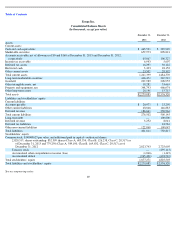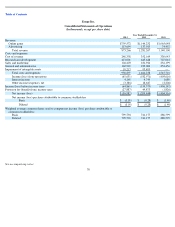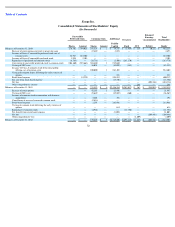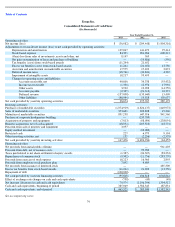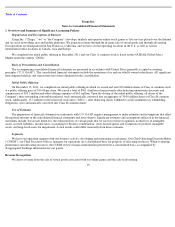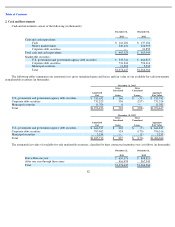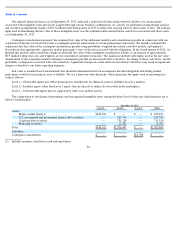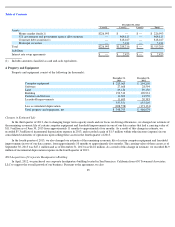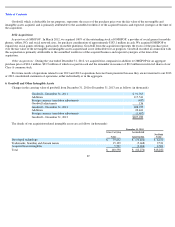Zynga 2013 Annual Report Download - page 81
Download and view the complete annual report
Please find page 81 of the 2013 Zynga annual report below. You can navigate through the pages in the report by either clicking on the pages listed below, or by using the keyword search tool below to find specific information within the annual report.
Table of Contents
From July 2010 through the third quarter of 2013, Facebook’s proprietary virtual currency, Facebook Credits, was the primary in-game
payment method for our games played on the Facebook platform. Under the terms of our agreement with Facebook, Facebook set the price our
players pay for Facebook Credits and collected the funds from the sale of Facebook Credits. Facebook’s stated face value of a Facebook Credit
was $0.10. For each Facebook Credit purchased by our players and redeemed in our games, Facebook remitted to us $0.07, which is the amount
we recognized as revenue. Accordingly, we recognized revenue net of the amounts retained by Facebook related to Facebook Credits
transactions because we did not set the pricing of Facebook Credits sold to the players of our games on Facebook. In July 2013, Facebook began
to transition payments made on the Facebook platform from Facebook Credits to Facebook’s local currency-based payments program. This
transition was completed in the fourth quarter of 2013. Under the terms of our agreement, Facebook remits to us 70% of the price we request to
be charged to the game player for each transaction. We recognize revenue net of the amounts retained by Facebook related to Facebook local
currency-based payments because Facebook may choose to alter our recommended price, for example by offering a discount or other incentives
to players playing on their platform. Additionally we do not receive information from Facebook indicating the amount of such discounts offered
to our paying players or regarding the actual cash paid by our players to Facebook. Accordingly, we are unable to determine the gross amount
paid by our players to Facebook. Prior to the implementation of Facebook Credits in our games, players could purchase our virtual goods
through various widely accepted payment methods offered in the games and we recognized revenue based on the transaction price paid by the
player.
For revenue earned through certain mobile platforms, including Apple iOS and Google Android, we recognize online game revenue based
on the gross amount paid by the player because we are the primary obligor and we have the contractual right to determine the price to be paid by
the player. We record the related platform and payment processing fees as cost of revenue in the period incurred.
Advertising
We have contractual relationships with agencies, advertising brokers and certain advertisers for advertisements within our games. We
recognize advertising revenue for branded virtual goods and sponsorships, engagement advertisements and offers, mobile advertisements and
other advertisements as advertisements are delivered to customers as long as evidence of the arrangement exists (executed contract), the price is
fixed or determinable, and we have assessed collectability as reasonably assured. Certain branded in-game sponsorships that involve virtual
goods are deferred and recognized over the estimated life of the branded virtual good or as consumed, similar to online game revenue. Price is
determined to be fixed and determinable when there is a fixed price in the applicable evidence of the arrangement, which may include a master
contract, insertion order, or a third party statement of activity. For branded virtual goods and sponsorships, we determine the delivery criteria has
been met based on delivery information from our internal systems or from third parties. For engagement advertisements and offers, mobile
advertisements, and other advertisements, delivery occurs when the advertisement has been displayed or the offer has been completed by the
customer, as evidenced by third party verification reports supporting the number of advertisements displayed or offers completed.
We report our advertising revenue net of amounts retained by advertising networks, agencies, and brokers because we are not the primary
obligor in our arrangements, we do not set the pricing, and we do not establish or maintain the relationship with the advertiser.
Multiple-element Arrangements
We allocate arrangement consideration in multiple-deliverable revenue arrangements at the inception of an arrangement to all deliverables
based on the relative selling price method, generally based on our best estimate of selling price. We offer certain promotions to customers from
time to time that include the sale of in-game virtual currency via the sale of a game card and also other deliverables such as a limited edition in-
game virtual good.
77




